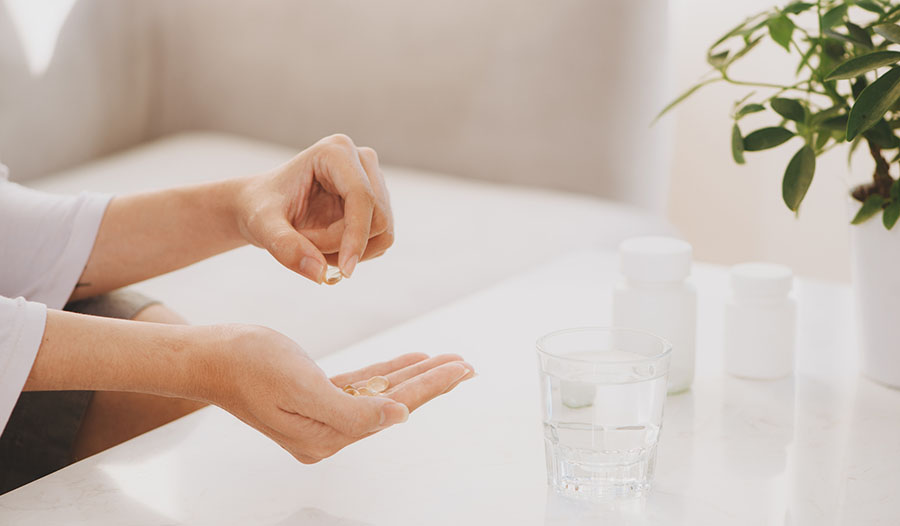Dodaci za optimizaciju zdravlja u toplijem vremenu

Vrijeme na suncu pruža niz zdravstvenih prednosti, uključujući izloženost vitaminu D, dok uobičajene aktivnosti u toplom vremenu, poput plivanja, skijanja na vodi i planinarenja, mogu pružiti koristi zdravlju srca i mozga.
Osim što su aktivni, postoje određeni dodaci za koje se može smatrati da pomažu u optimizaciji zdravlja i dobrobiti. Neki od ovih dodataka posebno su važni kada toplije temperature uzrokuju da se više ljudi znoji i izgubi ključne elektrolite. Važno je održavanje optimalne razine minerala, kao što su magnezij, kalcij i drugi.
Magnezij
Magnezij sudjeluje u preko 350 biokemijskih reakcija. Međutim, mnogi ljudi širom svijeta imaju nedostatak. Znoj, određeni lijekovi na recept - poput diuretičkih tableta za krvni tlak ili reduktora kiseline - mogu sniziti razinu magnezija. Trajna konzumacija alkohola također može smanjiti magnezij. Znakovi niskog magnezija uključuju grčeve mišića, trzanje kapaka, a ponekad čak i lupanje srca. Uzimanje dodatka magnezija može biti korisno.
Kalcij
Kalcij je jedan od najčešćih minerala u tijelu i na zemlji. Kalcij je odgovoran za zdravlje kostiju i mišića, uključujući kontrakcije srčanog mišića. Kada se u prehrani ne konzumira dovoljno kalcija, često se razmatra dodatak. Treba ga uravnotežiti s magnezijem.
Multivitamin
Po mom mišljenju, svatko bi trebao uzimati kvalitetan multivitamin jer pomažu u osiguravanju odgovarajuće razine uobičajenih vitamina i minerala koji često nedostaju, posebno kod onih koji imaju visok stres. Nadalje, tijekom putovanja dijeta često nije najzdravija, pa multivitamin pomaže osigurati konzumiranje preporučene dnevne doze (RDA), minimalne količine vitamina i minerala.
Proteini
Protein sirutke ili protein graška u prahu izvrsna su zamjena obroka i mogu biti od pomoći u postizanju željenog tijela na plaži. Protein sirutke također je koristan u pružanju detoksikacije jetre i jetre. Protein sirutke također sadrži kazein, protein na koji neki mogu biti osjetljivi. Međutim, vegetarijanci i oni koji jednostavno žele biljnu alternativu, protein graška mogu se uzeti u obzir.
Chia sjemenke
Bogate omega masnim kiselinama i vlaknima, chia sjemenke izvrstan su dodatak zobenim pahuljicama, jogurtu ili vašem omiljenom napitku. Kada se konzumiraju, chia sjemenke mogu pomoći u hidrataciji i stvoriti dugoročniji osjećaj sitosti. Ovo može biti od velike pomoći za mršavljenje i regulaciju kretanja grmlja.
Prevencija opeklina od sunca
Zaštita kože i sprečavanje opeklina od sunca važna je za mnoge, posebno za one s minimalnim pigmentom ili melaninom u svojoj koži. Minimiziranje prekomjernog vremena na suncu ključno je za sprečavanje opeklina od sunca, što kod nekih ljudi može povećati rizik od nekih kožnih bolesti.
Međutim, osiguravanje odgovarajućeg vremena na suncu također je važno za optimizaciju razine vitamina D . To je uistinu čin uravnoteženja.
Prvo, shvatite da dijeta bogata svježim voćem i povrćem, bogata antioksidansima, može biti od pomoći u sprečavanju opeklina od sunca. Kada to nije moguće, treba uzeti u obzir zeleni prah , uz sljedeće dodatke.
Astaksantin
Astaksantin je karotenoid crveno-narančaste boje koji se nalazi uglavnom u plodovima mora, poput lososa, škampa, krila, rakova, kvasca i određenih algi. To je ono što lososu, rakovima i jastogu daje crvenu boju. Studija iz 2011. raspravljala je o prednostima astaksantina za zaštitu kože, dok je studija iz 2013. također pokazala ovu antioksidacijsku sposobnost da pomogne u sprečavanju kroničnih kožnih bolesti kada se redovito uzima. Predložena doza: Prema uputama na naljepnici.
Ekstrakt borove kore štiti kožu
Ekstrakt borove kore ili piknogenol pomaže u zaštiti kože dok pomaže tijelu da obnovi tkivo. Njegova jaka antioksidativna snaga može pomoći u zaštiti od oštećenja ultraljubičastom sunčevom svjetlošću kada se uzima oralno i kada se primjenjuje lokalno na lice. Antioksidativna svojstva pomažu u zaštiti kolagena i elastičnog tkiva od oksidativnog oštećenja, primarnog uzroka starenja kože. Ovo oksidativno oštećenje najčešće je tijekom toplijih mjeseci kada sunce najviše sja. Predložena doza: Oralni dodaci, kako je predloženo na naljepnici. Topikalni piknogenol nanosi se izravno na kožu kako je naznačeno na naljepnici.
Vitamin B3 (nikotinamid)
Nikotinamid igra značajnu ulogu u popravljanju oštećenja kože. Studija iz 2017. pokazala je da redovit unos vitamina B3 smanjuje rizik od razvoja aktinične keratoze, prethodnice kronične bolesti kože. Studija iz 2010. također je podržala korist vitamina B3 u zaštiti kože. Imajte na umu da neki mogu osjetiti crvenilo kože prilikom uzimanja vitamina B3. Predložena doza: Prema uputama na naljepnici.
Vitamin D3 (holekalciferol)
Vjeruje se da vitamin D, koji se obično naziva vitamin D3, ima brojne zdravstvene prednosti. Studije su pokazale da oni s optimalnom razinom vitamina D u krvi imaju smanjeni rizik od brojnih kroničnih poremećaja.
Na mnogim mjestima širom svijeta, uključujući moju praksu u južnoj Kaliforniji, četiri od pet ljudi imaju nedostatak vitamina D. Poznato je da krema za sunčanje, koja blokira UV-A svjetlost, također sprječava kožu da proizvodi odgovarajući vitamin D u prisutnosti sunčeve svjetlosti. U određenom smislu, krema za sunčanje također je blokator vitamina D. Za one kojima je potrebna krema za sunčanje kako bi se spriječile opekline od sunca, treba razmotriti dodatak vitamina D koji će pomoći u optimizaciji razine u krvi.
Omega-3 masne kiseline
Vjeruje se da omega-3 masne kiseline ne samo da imaju koristi za srce, već, prema studijama, mogu imati i učinke protiv kožnih bolesti. Omega-3 esencijalne masne kiseline sastoje se prvenstveno od eikozapentaenske kiseline (EPA) i dokozaheksaenske kiseline (DHA).
Studija iz 2014. u časopisu Nutrition Journal pokazala je da većina Amerikanaca ne konzumira dovoljno omega-3 eteričnih ulja. Drugi u Europi, Rusiji i Aziji također su u opasnosti, pogotovo ako se hrana bogata omega-3 rijetko jede. Ovi izvori hrane uključuju ribu (skuša, bakalar i losos spadaju među najbogatije), chia sjemenke, sjemenke lana, sjemenke konoplje, orahai natto.
Studija iz 2016. u časopisu Journal of Clinical Medicine zaključila je da postoje značajni dokazi da bi suplementacija omega-3 masnim kiselinama mogla pomoći u smanjenju abnormalnosti kože bazalnih stanica i pločastih stanica (nije bilo učinka na opasniji rak kože melanoma). Međutim, studija iz 2014. pokazala je da oni s višim razinama omega-3 masnih kiselina imaju manji rizik od melanoma. Potrebno je više studija. Predložena doza: 1.000 mg do dva puta dnevno.
Vitamin C
Vitamin C, askorbinska kiselina, jedan je od najistraživanjih vitamina. Topljiv je u vodi, što znači da će se višak konzumiranog vitamina izlučiti urinom ako to nije potrebno. Vitamin C je moćan antioksidans koji se nalazi u mnogim svježim voćem i povrću, uključujući:
- Bele paprike
- Brokula
- Kupus
- Guava
- Kivi
- Naranče
- Papaja
- Paprika
- Ananas
- Jagode
Konzumiranje prehrane bogate vitaminom C dobar je način za optimizaciju ovog važnog antioksidansa. Vitamin C, kada se konzumira oralno, također ima mnoge prednosti kože. Studija iz 2018. godine, u kojoj su suplementi vitamina C uzimani ustima zajedno s proteinom kolagena , pokazala je značajno poboljšanje zdravlja kože nakon samo 12 tjedana.
Osim toga, primjena lokalnog vitamina C izravno na lice i druge dijelove tijela korisna je u zaštiti kože od sunčevih oštećenja, pokazuju studije.Predložena oralna doza: 500 mg do 1.000 mg dva puta dnevno. Topikalni vitamin C, prema uputama na naljepnici.
Liječenje nakon opeklina od sunca
Većina ljudi koji imaju opekline od sunca na kraju će dobiti ljuštenje kože - to je zapravo ono što liječnici nazivaju opekotinama prvog stupnja. Ako razvijete oticanje i intenzivne žuljeve, to bi bilo u skladu s opekotinama drugog stupnja. Osim gore navedenih dodataka, smanjenje izlaganja suncu i primjena zaštite od sunca također mogu biti korisna opcija za sprječavanje opeklina.
Ako se dogodi da dobijete opekline od sunca, prirodne alternative s lokalnom aloe verom mogu biti od pomoći u ublažavanju simptoma bolne opekline. Ako imate pristup biljci aloe vere, izbacivanje želea koji se nalazi unutar nje i nanošenje izravno na opekline može donijeti olakšanje. Dostupne su komercijalne formulacije ako nemate pristup biljci.
Neki naturopatski liječnici također preporučuju dodavanje lavande u gel aloe vere. To pruža dodatnu korist. Neki naturopatski liječnici također preporučuju upotrebu homeopatskih peleta belladonne i otapanje ispod jezika tri puta dnevno dok se ne postigne olakšanje.
Probiotici
Kada pomislimo na probiotike, obično mislimo na crijeva, a ne na kožu. Međutim, 70 do 80 posto našeg imunološkog sustava zapravo se nalazi u našim crijevima. Stoga je optimizacija zdravlja crijeva važna za održavanje jačeg imunološkog sustava. Budući da većina kroničnih bolesti ima veze s prekomjernim oštećenjima koja se javljaju negdje u tijelu i neadekvatnim popravkom i odgovorom imunološkog sustava, optimizacija imunološkog odgovora je kritična. Zdrav imunološki sustav može pomoći u sprečavanju zdravstvenih problema svih vrsta. Osim toga, zdrav imunološki sustav pomaže u sprečavanju prekomjernog rasta štetnih kožnih bakterija, što može biti posebno kritično nakon opeklina od sunca.
Reference:
- Yuan JP, Peng J., Yin K., Wang J. H. Potencijalni učinci astaksantina koji promoviraju zdravlje: Karotenoid visoke vrijednosti uglavnom iz mikroalgi. Mol. Nutr. Food Res. 2011; 55:150 —165. doi: 10.1002/mnfr.201000414.
- Rao AR, Sindhuja HN, Dharmesh SM, Sankar KU, Sarada R., Ravishankar GA Učinkovita inhibicija raka kože, tirozinaze i antioksidativnih svojstava estrima astaksantina i astaksantina iz zelene alge Haematococcus pluvialis. J. Agrić. Hrana Chem. 2013; 61:3842 —3851. doi: 10.1021/jf304609j
- Hautarzt. 2017 svibanj; 68 (5): 354-358. doi: 10.1007/s00105-017-3980-x.
- Photochem Photobiol Sci. 2010. Travanj; 9 (4): 578-85. doi: 10.1039/b9pp00146h.
- Papanikolaou Y, Brooks J, Reider C, Fulgoni VL. Odrasli u SAD-u ne ispunjavaju preporučene razine za unos ribe i omega-3 masnih kiselina: rezultati analize pomoću podataka promatranja iz NHANES 2003—2008. Časopis o prehrani. 2014; 13:31. doi: 10.1186/1475-2891-13-31.
- Bnema HS, Rhodes LE. Potencijalne prednosti omega-3 masnih kiselina kod nemelanomskog raka kože. Brown L, Rauch B, Poudyal H, ur. Časopis za kliničku medicinu. 2016; 5 (2) :23. doi: 10.3390/jcm5020023.
- Clin Cosmet Investig Dermatol. 2018 30. travnja; 11:195-201. doi: 10.2147/CCID.S150269. eKolekcija 2018.
- Al-Niaimi F, Chiang NYZ. Topikalni vitamin C i koža: mehanizmi djelovanja i kliničke primjene. Časopis za kliničku i estetsku dermatologiju. 2017; 10 (7): 14-17.
ODRICANJE OD ODGOVORNOSTI: Ovaj Wellness kutak nije namijenjen za pružanje dijagnoza...

















































































 Sadržaj
Sadržaj















